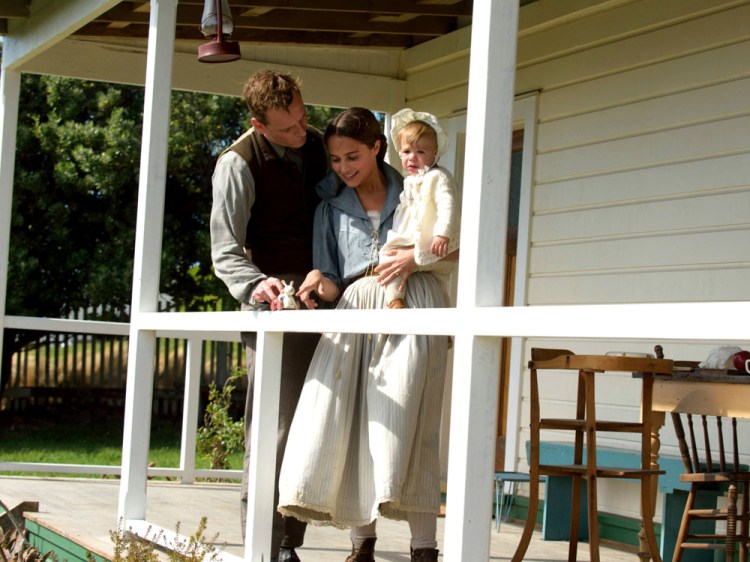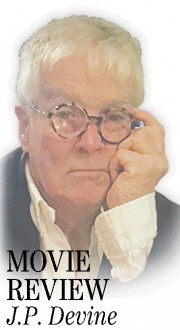“The wrong we have done, thought, or intended will wreak its vengeance on our souls.” ― C.G. Jung
Tom Sherbourne, a soldier, comes home from the Great War spiritually damaged. He has the proverbial thousand-yard stare in his eyes, wanting nothing to do with mankind. He seeks oblivion.
Where would you go to get as far as you can get from the glances of your fellow man? A lighthouse, of course, one of those towers that stand above the crashing surf, oblivious to the storm, isolated, forbidding, haunted.
Tom finds one, not like the lighthouses on magazine covers, but a far thrown one on an island off the coast of Australia.
The shore people, who have lost their light keeper, embrace him warmly, particularly Isabel Graysmark (Alicia Vikander), the daughter of a prominent citizen who eye-hugs him at once, locking their souls, it seems, forever more.
A maiden, fresh as the air, wed and bonded to spending a lifetime on a barren rock in the middle of nowhere with a man full of haunted dreams is the stuff of M. L. Stedman’s best-selling novel. Writer/director Derek Cianfrance has taken Stedman’s star-crossed couple and given us a powerful film.
The story centers around a startling incident that comes after Isabel has lost two babies, both tragedies explicitly filmed, ending with Tom burying both on the hill. Almost at the edge of sanity, Isabel spends her days staring at the sea.
Then fate intervenes with the sighting of a rowboat that holds a dead man and a crying baby girl. It seems to Isabel that God has stepped in and delivered her from a barren life on the rock. We know that come hell or high surf, Isabel will never give this miraculous baby up.
She concocts a story to give the locals that the last miscarriage didn’t happen, that this lost child is hers. Tom, reluctant at first, succumbs to the pleas of his broken-hearted Isabel. The populace accepts this.
When the day comes for the baptism, Tom, bored and wandering in the church graveyard, sees Hannah Roennfeldt (an always amazing Rachel Weisz) weeping over a vacant grave. When villagers tell him the story of her dead husband and her missing child, the film breaks in two parts. The second half is a torturous journey over the rocks of ethics, guilt and justice.
“Light” brings back memories of the story-telling of Jane Austen and others in novels so beloved by women. Cinematographer Adam Arkapaw provides the kind of startling beauty that David Lean blessed us with from “Lawrence of Arabia.” Each frame is breathtaking, forever memorable.
Vikander is without a doubt an amazing film presence. From the looks of passion in her eyes when first she sees her Tom to the fear, panic and near madness in the scenes involving the child, she never frees us from her gaze.
Fassbender has had an interesting career (“Macbeth,” “Steve Jobs,” “12 Years a Slave,”), all different, all smooth and professional, but nothing that has yet given him the panache of a Tom Ford. As soldier Tom, he is called upon, as he was in “Jobs,” to “play it straight.” He does that well.
Then there is Rachel Weisz, the incomparable Rachel who brings shadows to the brightest room, mystique and uncertainty to the clearest moments.
Rachel in “Light” does what she does in every film she enters: She entices and seduces us, and when she leaves, makes us want to leave the film and follow her. Okay. I’m a fan. See her in this, and bring the large box of Kleenex.
If there is such a thing in cinema as a “woman’s picture,” and cinema history proves it, “The Light Between Oceans” is such a film. It has the ingredients of that genre: heartbreak, passion, terrific acting, visual bliss and that often missing element, the longing of the lost.
J.P. Devine is a former stage and screen actor and the author of “Will Write For Food.”
Send questions/comments to the editors.




Success. Please wait for the page to reload. If the page does not reload within 5 seconds, please refresh the page.
Enter your email and password to access comments.
Hi, to comment on stories you must . This profile is in addition to your subscription and website login.
Already have a commenting profile? .
Invalid username/password.
Please check your email to confirm and complete your registration.
Only subscribers are eligible to post comments. Please subscribe or login first for digital access. Here’s why.
Use the form below to reset your password. When you've submitted your account email, we will send an email with a reset code.